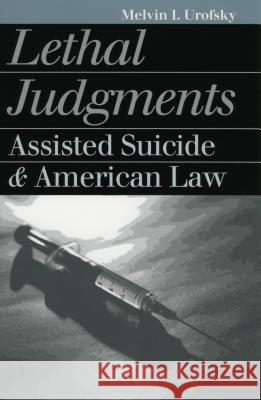Lethal Judgments: Assisted Suicide and American Law » książka
topmenu
Lethal Judgments: Assisted Suicide and American Law
ISBN-13: 9780700610112 / Angielski / Miękka / 2000 / 192 str.
In two 1997 decisions, the Supreme Court ruled that there is no constitutional right to physician-assisted suicide. Yet for many people this concept strikes to the heart of our sense of liberty even as it tugs at our hearts in the face of human suffering.
Lethal Judgments examines those cases, the law surrounding the plaintiffs' claims, and the moral debate over physician-assisted suicide. A concise and gracefully written overview of one of the most complex and contentious areas of American law, it lays out the conflict between individuals supporting privacy rights, due process, and equal protection, and those for whom moral and ethical considerations trump such concepts. Noted constitutional scholar Melvin Urofsky discusses the tangled legal, historical, ethical, and medical issues related to right-to-die arguments, then examines the Supreme Court's position in Washington v. Glucksberg and Quill v. Vacco. He shows how these 1997 cases relate to two other famous cases--Karen Ann Quinlan and Nancy Beth Cruzan--and carries the controversy up to the recent trials of Dr. Jack Kevorkian. Urofsky considers the many facets of this knotty argument. He differentiates between discontinuation of medical treatment, assisted suicide, and active euthanasia, and he sensitively examines the issue's social and religious contexts to enable readers to see both sides of the dispute. He also shows that in its ruling the Supreme Court did not slam the door on the subject but left it ajar by allowing states to legislate on the matter as Oregon has already done. By treating assisted suicide simply as a legal question, observes Urofsky, we miss the real importance of the issue. For patients with AIDS, cancer, and other debilitating illnesses--or even for those feeble from age--physician-assisted suicide is an expression of personal autonomy, and as modern medicine learns new ways to prolong life, more and more people will seek to exercise this option. Because right-to-die cases are likely to come before the high court again, this book provides students and general readers with a timely appreciation of their importance for legal theory and a useful way to reflect upon the choice between life and death.










